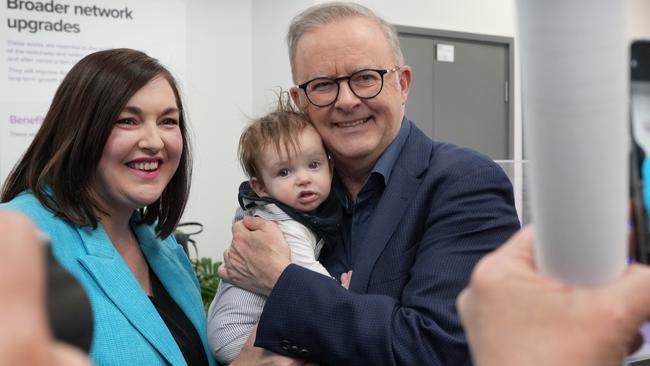Newspoll: No political dividend for Anthony Albanese despite throwing billions at cost of living


Nothing it is doing is producing a political dividend. On the contrary, support for Labor continues to soften.
On these numbers, you can forget about an early election.
Anthony Albanese’s colleagues are unlikely to thank him for willingly tipping Labor into minority government nine months earlier than he needs to.
A hung parliament is precisely what most voters now think will happen in May next year. And oddly, it doesn’t seem to trouble them enough to swing support demonstrably for or against the government to avoid one.
Volatility would appear to be baked into people’s expectations of the economy as well as the political landscape. At 50-50, the two-party vote suggests a 2 per cent swing since the last election. On a uniform basis, this could cost the government four seats and give effect to the loss of its majority.
For the Coalition, it would need to add another two points to start harvesting any significant number of seats to be in a position to form minority government itself. To form a majority, it would need a heck of a lot more. Nevertheless, the latest Newspoll shows the steady decline in support for Labor over the past six months.
At 32 per cent, it is now below its last election result.
At face value, Labor’s support continues to soften. There has been a steady decline, revealing a potential threat for the government.
The momentum would appear to be with the Coalition, which has improved its primary vote since the election by three points and is now a whisker away from moving into the 40s, which would swing the two-party-preferred vote in its favour for the first time.
What is clear is the disproportionate impact of inflation on lower and middle income households. The CPI numbers show people are hurting, and this is being reflected in a loss of support for the government.
And whatever the government does, it is clearly not regarded as being enough, despite the handouts, public sector wage rises and income tax cuts.
There has been zero dividend for all the money it is throwing around, with the law of diminishing electoral returns perhaps coming into play.
The trap for Labor, considering its cold war with the Reserve Bank over government spending, is that it has no room to move on further cost-of-living relief unless it wants to turn inflation into a hot war with the RBA. Yet while Labor’s vote softens, there has been no breakout for the Coalition.
And to the extent people aren’t following what’s going on, this may be a mistaken view considering the astute collective observation that a hung parliament is increasingly likely.


As parliament returns on Monday, one thing is becoming abundantly clear. Despite taxpayer-funded wage rises, income tax cuts and energy rebates, and hints of more handouts to come, the Albanese government’s position fails to improve.